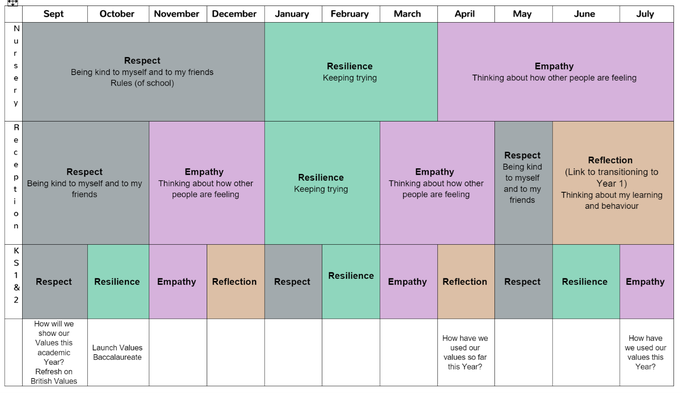Values-based education
Values-based living
At Fielding, we believe that values-based living is the foundation of a thriving and supportive community. Our approach centres around embedding key values—respect, resilience, reflection, and empathy—into every aspect of school life. By integrating these values into our teaching, interactions, and daily routines, we create an environment where children not only succeed academically but also develop essential life skills. Through activities like the Mind UP curriculum and a focus on emotional well-being, we work together with families to ensure that children grow into compassionate, thoughtful, and resilient individuals who contribute positively to society.
Values-Based Education
At Fielding, we promote an educational philosophy that values self, others, and the environment. Our approach is rooted in ethical principles that guide behaviour and decision-making.
Adults model these values and create space for reflection, helping pupils become confident learners and responsible citizens. Through this, children develop:
- Strong character and resilience
- Empathy and respect for others
- An appreciation of individual differences
Our values-based approach supports the promotion of fundamental British values, including:
- Democracy
- Individual liberty
- Mutual respect
- Tolerance of all faiths and backgrounds
Assemblies and school events enrich pupils’ spiritual, moral, social, and cultural development, helping them build a clear sense of right and wrong.
Our core values
We have four core school values that guide children's choices, behaviour and learning. These values are the basis of all our values teaching and will help children understand connected values.
Our core values are:
- respect,
- resilience,
- empathy,
- reflection.
These values have been chosen by carefully observing and discussing which of our previous values have worked well and which ones would develop children the most morally and educationally.

How we teach the core values
Children in the early years start by focusing on just the core values. As pupils move through years 1 to 6 we begin to widen their understanding of each core value by connecting with similar values. The focus with every value is what the value looks like to us and how it looks in action. Teaching of values is cyclical. We return to each core value frequently to deepen understanding.
The value of sustainability also underpins our wider curriculum, this is weaved through our learning challenges in all age-groups.
MindUP Curriculum
At Fielding, we use the MindUP curriculum to teach social and emotional learning. Based on neuroscience, positive psychology, and mindfulness, MindUP helps pupils:
- Understand how their brain works
- Recognise and manage emotions
- Develop focus and self-regulation
- Build empathy and resilience
Through regular lessons and daily mindfulness practices, pupils learn to reflect, stay calm, and concentrate—skills that support both wellbeing and academic success.
"Values and MindUP helps me to feel safer on the inside", Year 6 pupil
Preparing Children for Life in Modern Britain - No Outsiders
At Fielding, there are no outsiders. We celebrate difference and teach children that diversity is something to be valued.
We use the No Outsiders programme to help children understand and respect all members of our community. Through age-appropriate picture books, pupils explore themes such as:
- Equality and diversity
- Respect for different families, cultures, and beliefs
- Acceptance of others’ opinions
- Challenging stereotypes (e.g. sexism, ageism, racism)
These lessons align with our school values—respect, resilience, reflection, and empathy—and are closely linked to our RSHE curriculum and Monday assemblies.
Frequently Asked Questions
What if my child asks, “How do two men have a baby?”
Families are formed in many ways—through birth, fostering, or adoption. What matters is love and care.
Are children too young to learn about gay and lesbian relationships?
We teach children to respect all people, including those in same-sex families. Some of our pupils live in these families and deserve to see themselves represented.
Are you teaching “gay lessons”?
No. We are teaching about equality, as required by British law.
Can I withdraw my child from these lessons?
No. Relationships education is statutory. If you have concerns, please speak with your child’s teacher.
What if my religion disagrees with this?
We respect all beliefs. Our role is to teach children that diversity exists in society, even if individual beliefs differ.
Learn More
